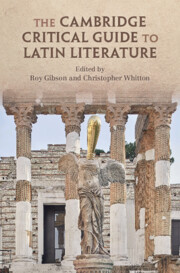Book contents
- The Cambridge Critical Guide to Latin Literature
- The Cambridge Critical Guide to Latin Literature
- Copyright page
- Dedication
- Contents
- Figures and Tables
- Contributors
- Preface
- Abbreviations
- Chapter 1 Introduction
- Chapter 2 Canons
- Chapter 3 Periodisations
- Chapter 4 Author and Identity
- Chapter 5 Intertextuality
- Chapter 6 Mediaeval Latin
- Chapter 7 Neo-Latin
- Chapter 8 Reception
- Chapter 9 National Traditions
- Chapter 10 Editing
- Chapter 11 Latin Literature and Linguistics
- Chapter 12 Latin Literature and Material Culture
- Chapter 13 Philosophy
- Chapter 14 Political Thought
- Chapter 15 Latin Literature and Roman History
- Chapter 16 Latin Literature and Greek
- Envoi
- Index Locorum
- General Index
- References
Chapter 8 - Reception
Published online by Cambridge University Press: 04 January 2024
- The Cambridge Critical Guide to Latin Literature
- The Cambridge Critical Guide to Latin Literature
- Copyright page
- Dedication
- Contents
- Figures and Tables
- Contributors
- Preface
- Abbreviations
- Chapter 1 Introduction
- Chapter 2 Canons
- Chapter 3 Periodisations
- Chapter 4 Author and Identity
- Chapter 5 Intertextuality
- Chapter 6 Mediaeval Latin
- Chapter 7 Neo-Latin
- Chapter 8 Reception
- Chapter 9 National Traditions
- Chapter 10 Editing
- Chapter 11 Latin Literature and Linguistics
- Chapter 12 Latin Literature and Material Culture
- Chapter 13 Philosophy
- Chapter 14 Political Thought
- Chapter 15 Latin Literature and Roman History
- Chapter 16 Latin Literature and Greek
- Envoi
- Index Locorum
- General Index
- References
Summary
This chapter provides an accessible overview of the wide, diverse and ever-expanding field of classical reception studies. It begins with an overview of the word ‘reception’ and its origins in philosophical hermeneutics, and surveys a series of critiques that have been made of the word’s usefulness. Then the chapter makes three claims. First, allusions to antiquity have frequently occurred within a broader matrix of challenge and contestation, and so the critical analysis of classical reception should pay attention to voices that challenge the values accorded to classical literature, as well as those who embrace them. Second, a focus on the history of education can help us see classical allusion as a social challenge rather than simply a submission to prevailing literary or cultural norms. Third, the study of reception is at its most vital as a mode of communication outside classics, whether to the public, to students or to scholars in other fields. Ultimately, reception studies make up a vital part of the future of classical scholarship, and yet questions remain about whether the word ‘reception’ best communicates the subject’s intellectual range and ambition.
Keywords
- Type
- Chapter
- Information
- The Cambridge Critical Guide to Latin Literature , pp. 395 - 446Publisher: Cambridge University PressPrint publication year: 2024



